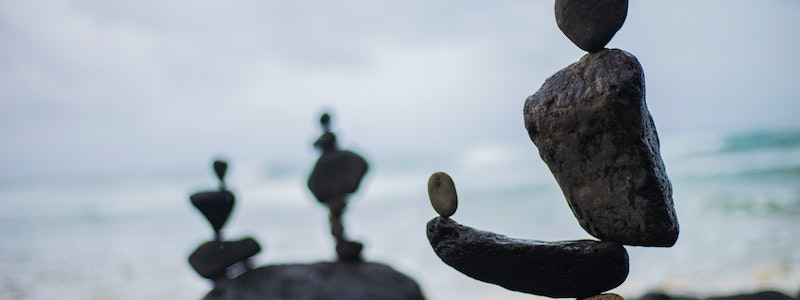
Spending most of my year travelling, constantly moving to different time zones, and sleeping at different hours, I’ve struggled with maintaining rules and routines. Even before my days of travel and general chaos, I struggled to find the right life balance between having strict rules Vs having a strict routine and which to prioritise and live my life by.
On the one hand, we have rules, the rigid pillars that uphold society and keep chaos at bay. On the other, we have routines, the gentle rhythms that help us find solace in the repetitiveness of daily life. But how do we strike the perfect balance between the two? Is there even a perfect balance to be found?
Through experience and a lot of trial and error, I’m happy to say I‘ve found a balance which not only works for me but one which I can maintain while travelling. To find the balance which works for you, it’s important to assess the pros and cons of each.
The Importance of Rules

Rules provide us with a clear sense of direction and boundaries. They help us stay on a pathway which fits our moral and ethical outlook on life, and they keep us on track when following our ambitions and achieving our goals. Rules can allow us flexibility in how we live but stop us from wandering too far from our chosen path. Rules bring order to our lives, and without them, we’d be lost in a sea of anarchy.
Rules have always been an attractive guide for life regarding diet, exercise, and work. Rather than having to eat, exercise, or work at set times, I can have certain goals I need to achieve each day or week. Rather than eating, sleeping, exercising, and working at set times, I can have rules about what I can and can’t eat and how long I should fast. Similarly, I can have strict amounts of sleep, work, and exercise I must maintain.
The problem with relying too heavily on rules means limiting spontaneity and feeling pressure or defeat when they are ultimately broken. It’s hard to have universal rules which can take into account different situations and contexts. When I set too many strict rules, I would often find myself having to break them, re-assess them, and compromise or change them on the fly. I struggled to have a solid set of rules I could live by.
The Comfort of Routine

Routines, on the other hand, offer us stability and predictability in an unpredictable world. Our brains love patterns, and establishing a routine helps reduce decision fatigue, allowing us to focus on the things that truly matter. A regular morning routine, for example, can ensure that we start our days on the right foot (if you are like me and have a penchant for stepping on rogue Legos in the morning), and routine in diet, exercise and sleep, helps our body develop better metabolism.
When I have long periods of time in the same place, I often switch from having a rule-based life to one more centred around time and routine. Rather than a rule of eating during a 6-hour window each day, I can eat at the same times each day and sleep and wake around the same time. Rather than having a daily or weekly amount of work and exercise I need to achieve, I can have set hours for exercise and work, which I follow strictly. With a life heavily centred around routine, I quickly found that I achieved much better health and got more work done.
However, routines can become a double-edged sword. On one hand, they offer comfort; on the other, they can lead to boredom and complacency. If we allow our lives to be ruled by routines, we risk losing the spark that makes life exciting and meaningful. For me, I’ve never been able to live a routine-based life for more than 2-3 months. Beyond that, I start to lose motivation, I develop apathy, I crave a different diet, and I feel a rebellious urge to do something different. Even with adding in cheat days and taking days off, I find it takes time to get back into routine, after which monotony soon returns.
The Influence on Mental Health
Both rules and routines can have a significant impact on mental health. Rules provide structure, and adhering to a set of guidelines can alleviate feelings of anxiety and uncertainty. Routines, too, can foster a sense of security and help regulate our moods, making them an essential component of mental well-being.
But when either rules or routines become too dominant, our mental health can suffer. The rigidity can lead to an unhealthy obsession with control, while the monotony of routine can breed feelings of stagnation and depression. What’s certain is both can be crucial to maintaining good mental health, but the key is to strike a balance between the two.
Finding the Perfect Balance

So how do you find the elusive perfect balance between rules and routine? The answer lies in self-awareness and intentional decision-making. It is important to recognise when the scales are tipping too far in one direction and to take the necessary steps to recalibrate.
As someone who travels extensively, I still find it much more effective to have rules as the backbone of my lifestyle; In diet, I have certain foods I will and won’t eat, but I’ll also show flexibility, having a rule of allowing myself to try new foods. I will also have a set amount of exercise I need to do each week and will make sure I do some form of strenuous activity every day. I’ll also have set amounts of work I must complete, but this will vary depending on my workload, and be strict about getting the right amount of sleep as a priority.
However, I also adopt mini routines. Whenever I arrive in a new place, I look to set a short-term routine allowing me to eat, exercise, work, and sleep at the same times each day. This can often be a challenge when facing jetlag and big time zone changes, making it impractical on short trips, but on longer trips, I will persevere and work hard to establish the new routine.
The perfect balance of rules and routine will look different for everyone. We each have our unique needs and preferences. In order to maximise your ideal balance, it’s necessary to experiment. It’s also essential to regularly check in with yourself and assess whether your current balance of rules and routine is serving you well. If not, don’t be afraid to make adjustments.
While we may not always achieve the perfect balance, it is through our pursuit of it that we learn, grow, and ultimately find the harmony between the comfort of routine and the excitement of breaking the rules. By allowing for flexibility and spontaneity without sacrificing the benefits of structure and predictability, you can find a combination of certain life rules and a flexible routine which works for you.




